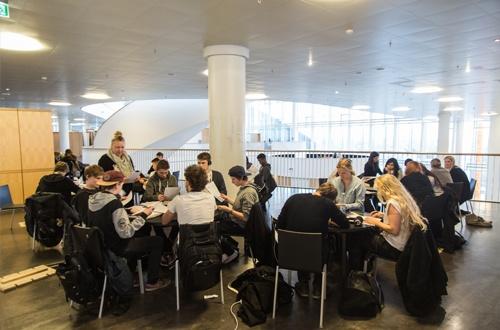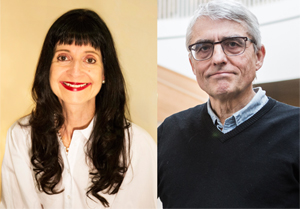“I think it’s necessary for all schools in our times to be able to answer the fundamental question: why do we need schools? What is the school’s contribution to developing new citizenship?” – Allan Kjaer Andersen
Could the traditional rows of desks and chalkboard-centered classrooms soon become a relic of a bygone age? Open learning spaces enhance the opportunities for group discussions, collaborative project learning, and individual student training. Most importantly, they allow teachers to function as a mentor, rather than purely an instructor.
Allan Kjaer Andersen know this. He was the Principal of Ørestad Gymnasium (OG) in Copenhagen, a school globally renowned for its open learning spaces and emphasis on a 21st century digital learning curriculum. Allan is creating an open school in Bangalore, India, and he says the most important value he will take with him is “the free school atmosphere with students and teachers as active co-creators.”
He joins us in The Global Search for Education to talk about lessons learned from the past that are inspiring his school of the future.
At OG, you focused on 21st century competencies – e.g. digital, media, global and entrepreneurial skills. All these were in addition to a “traditional curriculum.” Can you please share your perspectives on what is a “relevant” curriculum in the Age of Dr. Google? What should schools be doing about balancing knowledge with soft skills as well as student well-being?
Schools must do more than just teaching the traditional subjects and they must do it in a way that is engaging if they wish to educate people that can live, thrive and cope with the challenges of the rapidly changing world. Schools of the 21st century help students to develop their living skills: character and identity, their attitudes and values, and their moral compass.
We defined a change-maker as a person who exhibits global citizenship, a mindset for sustainability, digital competences, career competencies, innovation, and creativity.
I think it’s necessary for all schools in our times to be able to answer the fundamental question: why do we need schools? What is the school’s contribution to developing new citizenship?
How was pedagogy at the OG school innovative? What did you see as the new opportunities as well as the challenges for it?
The teaching at OG is a mixture of innovative and more traditional pedagogical strategies. The learning environments are shifting between conventional classrooms and open learning spaces. We emphasize activities where students are active in the open learning spaces. For example, there will be whole weeks where the students just work on projects.
Compared to traditional schools, the students work a lot more on their own with the teachers as consultants. The teacher is still the traditional instructor in the classroom, but in the open learning spaces the teacher has the role of a coach or consultant that can give feedback to the group or the individual student.
There have been quite a few challenges in developing the teaching at OG. The pressure from the state curriculum pulls the teachers in the direction of subject-based classroom teaching. Even innovative and progressive teachers feel safe in that role. It’s a challenge to develop teaching where the students’ work is problem-based and where the teachers can be sure to prepare the students for the exams.
And, of course, noise is a challenge. At OG, the open learning spaces are open and connected from the cellar to the fourth floor, so if there is noise somewhere in the building, it can be heard in every corner of the building. The answer to this challenge is pedagogy and culture. At OG a silent culture during the lessons has evolved gradually, as new students learn from the older.

“It’s a challenge to develop teaching where the students work is problem-based and where the teachers can be sure to prepare the students for the exams.” – Allan Kjaer Andersen
What are the most important learning lessons/experiences you will bring from OG and apply to the Bangalore context?
The most important value I will take with me is the free school atmosphere with students and teachers as active co-creators. The school in Bangalore will be an open school. Open to learning from the world outside the school, open to let real life problems be the core of our teaching, open for teaching organized in collaboration with companies and institutions, open for strategic partnerships with companies and other schools, and open to the global village.

“My vision is a school that isn’t really a school but an institutional framework for the organization of learning.” – Allan Kjaer Andersen
How do teachers keep pace with digital natives? What was your experience at OG? Will it be different in Bangalore? Who’s teaching who?
The teachers at OEG are not IT experts. They are average IT users, but they are not afraid to try new things. The most important tool for development of the teachers’ IT competences has been the professional learning communities of the subject teachers through sharing and developing materials and methods. The teachers are not afraid to fail, and they are not afraid to learn from competent students. Often teachers use qualified students as an extra teaching resource.
The school must prepare the students to become citizens in a society where digital media infuses every aspect. It’s not a question about which media is best for reading; it’s about preparing for modern citizenship.
Look ahead into the future a decade from now – what are the main innovations you predict for the world’s most cutting-edge schools?
There’s an urgent need for schools to change if they want to be relevant for the students and prepare them for their future living conditions. So why don’t schools change?
I think that an essential answer to that question is that the school is a well-known structure, building and curriculum. Everyone has tried it. The teachers inherit their ideas of good teaching from teachers they have experienced.
Therefore, globalization and digitization are essential pulling mechanisms that force schools to change. I hope that in the future, schools will be spaces where teaching and learning are personalized and connected to the global village. My vision is a school that isn’t really a school but an institutional framework for the organization of learning.

C. M. Rubin and Allan Kjaer Andersen